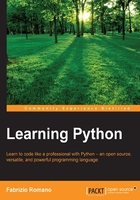
About Python
Before we get into the gory details, let's get a sense of why someone would want to use Python (I would recommend you to read the Python page on Wikipedia to get a more detailed introduction).
To my mind, Python exposes the following qualities.
Portability
Python runs everywhere, and porting a program from Linux to Windows or Mac is usually just a matter of fixing paths and settings. Python is designed for portability and it takes care of operating system (OS) specific quirks behind interfaces that shield you from the pain of having to write code tailored to a specific platform.
Coherence
Python is extremely logical and coherent. You can see it was designed by a brilliant computer scientist. Most of the time you can just guess how a method is called, if you don't know it.
You may not realize how important this is right now, especially if you are at the beginning, but this is a major feature. It means less cluttering in your head, less skimming through the documentation, and less need for mapping in your brain when you code.
Developer productivity
According to Mark Lutz (Learning Python, 5th Edition, O'Reilly Media), a Python program is typically one-fifth to one-third the size of equivalent Java or C++ code. This means the job gets done faster. And faster is good. Faster means a faster response on the market. Less code not only means less code to write, but also less code to read (and professional coders read much more than they write), less code to maintain, to debug, and to refactor.
Another important aspect is that Python runs without the need of lengthy and time consuming compilation and linkage steps, so you don't have to wait to see the results of your work.
An extensive library
Python has an incredibly wide standard library (it's said to come with "batteries included"). If that wasn't enough, the Python community all over the world maintains a body of third party libraries, tailored to specific needs, which you can access freely at the Python Package Index (PyPI). When you code Python and you realize that you need a certain feature, in most cases, there is at least one library where that feature has already been implemented for you.
Software quality
Python is heavily focused on readability, coherence, and quality. The language uniformity allows for high readability and this is crucial nowadays where code is more of a collective effort than a solo experience. Another important aspect of Python is its intrinsic multi-paradigm nature. You can use it as scripting language, but you also can exploit object-oriented, imperative, and functional programming styles. It is versatile.
Software integration
Another important aspect is that Python can be extended and integrated with many other languages, which means that even when a company is using a different language as their mainstream tool, Python can come in and act as a glue agent between complex applications that need to talk to each other in some way. This is kind of an advanced topic, but in the real world, this feature is very important.
Satisfaction and enjoyment
Last but not least, the fun of it! Working with Python is fun. I can code for 8 hours and leave the office happy and satisfied, alien to the struggle other coders have to endure because they use languages that don't provide them with the same amount of well-designed data structures and constructs. Python makes coding fun, no doubt about it. And fun promotes motivation and productivity.
These are the major aspects why I would recommend Python to everyone for. Of course, there are many other technical and advanced features that I could have talked about, but they don't really pertain to an introductory section like this one. They will come up naturally, chapter after chapter, in this book.